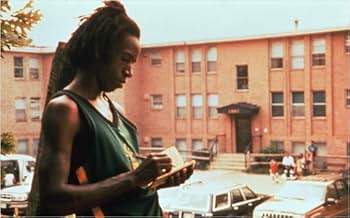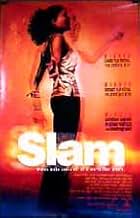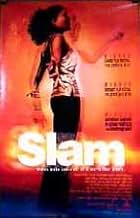Slam
- 1998
- Tous publics
- 1h 40m
IMDb RATING
7.0/10
2.5K
YOUR RATING
Grand Jury Prize, 1998 Sundance Film Festival. A talented youth (Saul Williams) copes with urban crime and despair by competing in poetry slams. Sonja Sohn of "The Wire" costars.Grand Jury Prize, 1998 Sundance Film Festival. A talented youth (Saul Williams) copes with urban crime and despair by competing in poetry slams. Sonja Sohn of "The Wire" costars.Grand Jury Prize, 1998 Sundance Film Festival. A talented youth (Saul Williams) copes with urban crime and despair by competing in poetry slams. Sonja Sohn of "The Wire" costars.
- Awards
- 4 wins & 4 nominations total
Rhozier Brown
- Public Defender
- (as Rhozier T. Brown)
Featured reviews
In Marc Levin's Slam, perhaps the greatest asset he and cinematographer Mark Benjamin bring is the documentary-style to this urban-based drama. For the first few minutes of the film, I thought this would be a documentary. In a sense, when I realized when it wasn't it was a letdown, because even though this is a close-to-life depiction story of a kid in the ghettos of Washington DC, somehow if it really was a documentary it might've been even more compelling. As it is, Slam is a very naturalistic first-person drama, and the film deals with a protagonist that isn't hard to identify with, even when things seem a little over-done or even when it's a little naïve.
Basic story in two sentences Raymond Joshua (Saul Williams, also one of the film's co-writers) is set up to go to prison for pot, and while in prison he meets a few people that recognize his skills as a writer and poet.
When he gets out he wants to hold on to the freedom he knows he can attain, but he doesn't know how. With this conflict, Raymond is a character that is recognizable and identifiable with the audience. And with this, Williams creates a constantly believable performance even when his character may not sound entirely believable or realistic.
Although the performances are a plus for the film's success, such as Bonz Malone as Hopha, and Sonja Sohn as the writing teacher/poet Lauren, for me the style over-passed the substance. Though the poetry was inspired and the poets in the film who spoke them were very good, some of the story elements were not as effective as they could've been. For example, there's a blind-men analogy when Raymond gets out of jail and sees that his pot-dealer friend, who got shot, is now blind. Raymond is morally in the right in their final scene together, but it's a little too thick of a message for my taste when Raymond says, 'I once was blind too, now I can see.' Williams' poetry (which I assume he wrote himself) is interesting, although it's his delivery that catches my ear over the content. In a pivotal scene his poetry saves him from a beating in the prison yard, yet somehow it doesn't feel as real as some of the other scenes, like with him and Malone's character.
As I said, the style was what held the film, especially for such a low budget. I loved the use of the hand-held, shaky mis-en-scene, as though someone was allowed to peek into the atmosphere of DC. And from a psychological standpoint, Levin seems to extract what the essence is of Raymond and his neighborhood. Through his usage grainy color and then to a 8mm camcorder for flashbacks from Raymond, I felt the emotional impact that Levin was going for, the mix of disorientation and of being in a free-fallin' kind of society where you don't know what can happen next. I just wished that I saw more of that with the characters and the story. Cool ending though. B
Basic story in two sentences Raymond Joshua (Saul Williams, also one of the film's co-writers) is set up to go to prison for pot, and while in prison he meets a few people that recognize his skills as a writer and poet.
When he gets out he wants to hold on to the freedom he knows he can attain, but he doesn't know how. With this conflict, Raymond is a character that is recognizable and identifiable with the audience. And with this, Williams creates a constantly believable performance even when his character may not sound entirely believable or realistic.
Although the performances are a plus for the film's success, such as Bonz Malone as Hopha, and Sonja Sohn as the writing teacher/poet Lauren, for me the style over-passed the substance. Though the poetry was inspired and the poets in the film who spoke them were very good, some of the story elements were not as effective as they could've been. For example, there's a blind-men analogy when Raymond gets out of jail and sees that his pot-dealer friend, who got shot, is now blind. Raymond is morally in the right in their final scene together, but it's a little too thick of a message for my taste when Raymond says, 'I once was blind too, now I can see.' Williams' poetry (which I assume he wrote himself) is interesting, although it's his delivery that catches my ear over the content. In a pivotal scene his poetry saves him from a beating in the prison yard, yet somehow it doesn't feel as real as some of the other scenes, like with him and Malone's character.
As I said, the style was what held the film, especially for such a low budget. I loved the use of the hand-held, shaky mis-en-scene, as though someone was allowed to peek into the atmosphere of DC. And from a psychological standpoint, Levin seems to extract what the essence is of Raymond and his neighborhood. Through his usage grainy color and then to a 8mm camcorder for flashbacks from Raymond, I felt the emotional impact that Levin was going for, the mix of disorientation and of being in a free-fallin' kind of society where you don't know what can happen next. I just wished that I saw more of that with the characters and the story. Cool ending though. B
10mkw-5
Really good and believable script, atmosphere and flow, very well acted. It doesn't even matter if the camera crew is totally visible in many pictures in one guys mirror-sun glasses. This is definitely one of the best "hood" movies of the nineties. It's also shows you a different kind of hood that you're used to: OK there's some drug selling and rapping, but that's the reality, and reality is what these movies are about. But that's only the beginning: This film grows to be really deep and interesting story about generations, art making (=self-expression), life goals, and the Tragedy of the contemporary world. In this film, for example the rapping thing is portrayed quite funnily; It's more real, in other words also more sad and also more serious, than in the other movies. This film shows what rap, and any kind of art and self-expression is: It's about salvation, it's about ideals, it's about dreaming, it's about rising above. It's about creating your OWN world inside or outside, or above, the world which you don't like and don't wanna support. It's about prisons of the mind that you or some other people have created in your mind which you gotta grow out of to be free. It's a story of courage. It's about miracle of life. This film really shows what it's all about, if someone already don't know. It's a PEOPLE's culture. The MTV and money sh** don't have and will never have anything to do with it. It's a people's way of expressing themselves in their communities. And this film shows it all real beautifully. One of the best movies about artist's life too. It also grows to be a beautiful love story. In all ways it's better than all it's parts combined and all hopes imagined.
It's not the best acted film in the world, like some reviewer said, but it might at the top level among the other best. The film is also very nicely shot. It doesn't actually feel like a documentary, but more like what it really is: Quite cheaply and simply (=that means freely) made self-expression. You can feel the joy of the making. I don't have to even mention that the soundtrack is great: One of the best. The world needs this kind of movies. (Or does it?...) At least somebody's world does. Somebody else's world might need movies that glorify violence. This is not that kind of movie. This is not 50 cent. This is not death. This is life.
It's not the best acted film in the world, like some reviewer said, but it might at the top level among the other best. The film is also very nicely shot. It doesn't actually feel like a documentary, but more like what it really is: Quite cheaply and simply (=that means freely) made self-expression. You can feel the joy of the making. I don't have to even mention that the soundtrack is great: One of the best. The world needs this kind of movies. (Or does it?...) At least somebody's world does. Somebody else's world might need movies that glorify violence. This is not that kind of movie. This is not 50 cent. This is not death. This is life.
Without Saul Williams this film could not have been made. Its as if it was tailor made for William's awesome rapping talents without which the film would be pointless.
This film is definitely a milestone in black cinema. Its fresh, breathtaking, original, powerful and 'takes no prisoners' (mind the pun).
And a couple of word about the soundtrack - the ever excellent DJ Spooky takes the credits combining the most powerful hip hop outfits around, to create an intensive soundtrack which completes this film and leaves you open jawed.
This film is definitely a milestone in black cinema. Its fresh, breathtaking, original, powerful and 'takes no prisoners' (mind the pun).
And a couple of word about the soundtrack - the ever excellent DJ Spooky takes the credits combining the most powerful hip hop outfits around, to create an intensive soundtrack which completes this film and leaves you open jawed.
When growing up in the ghetto one of the hardest things to do is find yourself. "Slam" written and directed by Mark Levin, is the story of a man named Ray Joshua (Saul Williams). Being surrounded by gangs and drugs he gets sent to jail when a drug deal goes bad. While in jail he realizes his passion for poetry. This inspiring story of a man overcoming the ghetto, turning his life around, and discovering his passion is a story that shows if you have a good head on your shoulders you can do anything you put your mind to.
In the movie there are many things that try to define Ray: society and race and the justice system are some of the major ones. Somehow with all the forces against him through expression and poetry Ray defines himself. After getting arrested for a small charge of possession of marijuana because of the justice system he is forced to either confess or go to court and fight it which would wither way get him 3-10 years. There was no winning for him.
With the themes of race, drugs, gangs and jail this movie makes it easy for people to connect to. One of the best parts of the movie was at the end when Ray finally finds his way and performs in a poetry slam. It was a powerful scene full of emotion. This movie sends many different messages. One of which is when you find something you are passionate for you should find a way to show others and express yourself through it. For example when Ray performed at the poetry slam; it wasn't his usual scene but he got out of his bubble and went for it.
In the movie there are many things that try to define Ray: society and race and the justice system are some of the major ones. Somehow with all the forces against him through expression and poetry Ray defines himself. After getting arrested for a small charge of possession of marijuana because of the justice system he is forced to either confess or go to court and fight it which would wither way get him 3-10 years. There was no winning for him.
With the themes of race, drugs, gangs and jail this movie makes it easy for people to connect to. One of the best parts of the movie was at the end when Ray finally finds his way and performs in a poetry slam. It was a powerful scene full of emotion. This movie sends many different messages. One of which is when you find something you are passionate for you should find a way to show others and express yourself through it. For example when Ray performed at the poetry slam; it wasn't his usual scene but he got out of his bubble and went for it.
This movie is responsible for a lot of things and after finally seeing it I now know why. What it lacks in polished film making it more than makes up for in honesty, passion and ambition. From the performances through to the writing and cinematography everything is raw and beautiful and vibrant with life in a way that we never see in Hollywood films. And I'll be damned if the subject isn't poetry and how it exists in and what it makes of real life. How it is real life. In many aboriginal cultures there is no separate category for art that differentiates it from the rest of life and this movie hearkens back to that cultural tradition. A young Saul Williams defines his life, takes action, heals himself and saves others through his poetry. All of the acting is fresh and real but Saul Williams and Sonia Sohn especially shine, as they should. There is something real going on that is being captured here and the rest of America better know what it is.
Did you know
- TriviaThis film was restored by the Academy Film Archive and the UCLA Film & Television Archive. Funding was provided by the Academy of Motion Picture Arts and Sciences, Sundance Institute, UCLA Film & Television Archive, and the restoration premiered in 2024 at the UCLA Festival of Preservation.
- GoofsWhen Ray is on his way to the poetry night, he gets on the metro at the Cleveland Park station, rides, and gets off at the metro at the same station: Cleveland Park.
- Quotes
Ray Joshua: The wind is the moon's imagination wandering. It seeps through cracks, ripples the grass, explores the unknown. My love is my soul's imagination. How do I love you? Imagine.
- How long is Slam?Powered by Alexa
Details
Box office
- Budget
- $1,000,000 (estimated)
- Gross US & Canada
- $1,009,819
- Gross worldwide
- $1,009,819
- Runtime
- 1h 40m(100 min)
- Color
- Sound mix
- Aspect ratio
- 1.85 : 1
Contribute to this page
Suggest an edit or add missing content




























